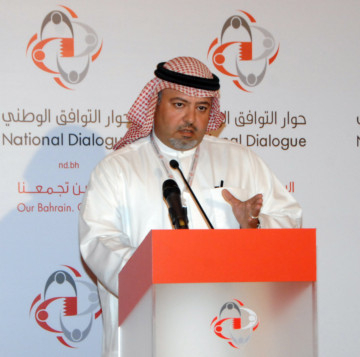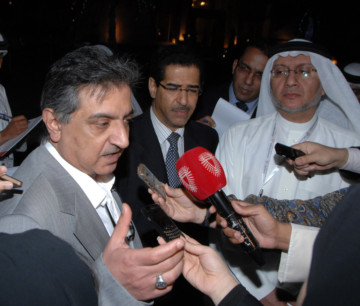
Manama: Bahrain’s national dialogue has survived its first serious scare after the 27 participants agreed to set aside a controversial issue and move forward with the other issues on the agenda.
Ambiguous statements and sabre-rattling by several participants on Sunday had raised concerns that there would be no progress on Wednesday at the ninth round of the national talks between the two major political alliances, the parliament and the government to break a political impasse that has gripped Bahrain for almost two years.
However, participants wearing broad smiles reported a serene atmosphere as they left the dialogue venue late in the evening.
The opposition alliance, which brings together six political societies, had insisted on the presence of a representative of King Hamad Bin Eisa Al Khalifa at the talks. The opposition argued that such a point man would help achieve results and lend greater significance to the talks process.
However, Al Fateh, an alliance of 10 political societies, the government and the parliament have rejected the demand, stressing that an earlier agreement between all the interlocutors did not stipulate the presence of a representative of the king.
“We have agreed to postpone the discussion of this issue in order to be able to continue the dialogue,” Shaikh Khalid Bin Ali Al Khalifa, the justice minister and one of the three ministers representing the government at the talks, said following the discussions on Wednesday. “The principle of discussing this issue has not been finalised. However, for us, there is no concession and the issue of the representatives has been settled,” he said.
Jameel Khadim, the spokesperson for the opposition, insisted that the issue had not been settled and that the opposition had merely consented to change its priorities. “We look around us and we see that talks in countries like Yemen do involve the president,” he said.
However, Shaikh Khalid refused comparisons with talks elsewhere, saying that each country had its own ground reality. “Everybody should be looking at the reality here,” he said. “We wish all the others luck, but the situation is vastly different in Bahrain. What we do need is that people should be open with one another and engage in a serious national dialogue. I am confident we can do it. Our moderators are well qualified and have impressive mediation experience. The priority is to address the internal audience, not the foreign one,” he said.
Another point of contention relates to the formalisation of the dialogue results. The opposition says the only option is to conduct a referendum, while Al Fateh says the outcome should be referred to the elected parliament.
“We need to have the people’s views on the results and therefore, we should go for a referendum. The results are conveyed to the king and then they are put to a referendum,” Khadim said.
However, Ahmad Juma, the spokesperson for Al Fateh, said that such a move would undermine the role of the parliament. “We do have constitutional institutions and they cannot be sidelined, overlooked or ignored,” he said.
The parliament is represented in the dialogue by eight lawmakers, four from each chamber. Each of the two political alliances has eight delegates.
The next round of talks will be held on March 31, the participants said.
An action group selected by the four parties to the talks will hold a session to go through the points to be raised at the next round.













